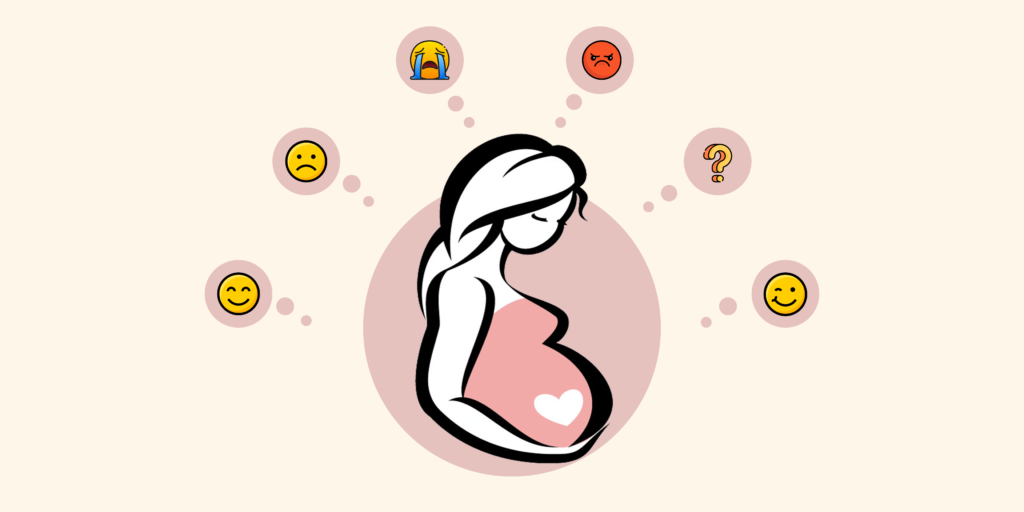Mental Health
Pregnancy is all about mixed feelings, that a pregnant women experience. Depression and anxiety are two most common mental health problems in pregnancy. Mental health during pregnancy is a crucial aspect of maternal wellbeing and that of growing baby. Expecting mothers may experience a range of emotional changes due to hormonal fluctuations, physical discomfort, and the stresses of upcoming parenthood. It’s essential for healthcare providers to recognize and address mental health issues during prenatal care, offering support and treatments to promote a healthy pregnancy. Early identification and treatment can lead to better outcomes for both mothers and their children, highlighting the importance of integrating mental health care into prenatal services.
On this page
1. How can pregnancy affect mental health?

Pregnancy can significantly affect mental health due to a variety of factors:
- Hormonal Changes: Fluctuations in hormones like estrogen and progesterone can lead to mood swings, anxiety, and depression.
- Physical Discomfort: Symptoms such as nausea, fatigue, and body changes can contribute to stress.
- Emotional Adjustments: The prospect of becoming a parent can create a range of feelings, both positive and negative at times, leaving some parents worried about the future.
- History of Mental Health Issues: Women with a history of depression, anxiety, or other mental health disorders may worse their symptoms during pregnancy.
- Isolation: Some women may feel isolated or disconnected from their social circles, leading to feelings of loneliness.
- Body Image Concerns: Changes in body shape and weight can affect self-image and contribute to mental health challenges.
Addressing these conditions through support and open communication with healthcare providers can help promote better health during pregnancy.
2. Can mental illness be detected during pregnancy?
Mental illnesses can’t be diagnosed clearly during pregnancy, but there are signs and symptoms that can be observed. Some women may experience mental health issues such as depression or anxiety during pregnancy or after birth. Doctors often explore these issues through questions and psychological history interviews. Early diagnosis and support can help parents and children manage symptoms and improve outcomes. If you or someone you know is experiencing mental health issues during pregnancy, it’s important to seek help.
3. How mental health issues can affect your baby?
Mental health issues during pregnancy can have various effects on both the parent and the baby. Here are some potential impacts:
- Prenatal Development: Stress, anxiety, or depression can affect the development of the fetus. Stress hormones can affect the child’s brain development, which can lead to behavioral problems or depression later in life.
- Birth Outcomes: Mental health problems may be associated with problems such as premature birth, low birth weight, or complications during birth.
- Parent-Child Bonding: A mother’s health affects her child’s ability to bond with her child after birth. Conditions such as postpartum depression can affect a mother’s responsiveness and attachment to her baby.
- Behavioural and Emotional Health: Babies born to parents with untreated mental health issues may be at higher risk for developing emotional and behavioural problems as they grow.
- Long-Term Effects: Children may face increased risks of anxiety, depression, or behavioural issues later in life, particularly if the parent’s mental health issues are severe or chronic.
It is important for expectant mothers to pay attention to their health and seek support when necessary, as this can have a positive impact on their health and the development of their children.
4. How are mental health problems treated?
Mental health problems can be treated through a variety of approaches, often tailored to the individual’s needs. Here are some common treatment options:
- Therapy:
Cognitive Behavioural Therapy (CBT): Helps individuals identify and change negative thought patterns and behaviours.
Psychotherapy: Talk therapy can provide support and coping strategies.
Support Groups: Sharing experiences with others can foster a sense of community and understanding. - Medication: Antidepressants, anti-anxiety medications, mood stabilizers, Antidepressants, anxiolytics, mood stabilizers, and antipsychotics may help control symptoms. Medication should be prescribed and monitored by a healthcare professional, especially during pregnancy or breastfeeding.
- Lifestyle Changes: Regular exercise, a balanced diet, adequate sleep, and stress-reduction techniques like medication and yoga can improve mental health.
- Support Systems: Providing positive support from family, friends, or community resources can help provide emotional support and encouragement.
- Holistic Approaches: Some individuals find benefits from alternative therapies like yoga, acupuncture, or herbal supplements, though these should be discussed with a healthcare provider.
- Education and Awareness: Understanding mental illness can empower people and reduce stigma, helping them seek help when they need it.
If you are suffering from mental health problems, than it’s important to consult healthcare provider.
4. Good mental health in pregnancy
Maintaining good mental health during pregnancy is essential for the well-being of both the parent and the baby. Here are some strategies to promote mental health during this time:
- Seek Support: Talk to your partner, family, or friends about your feelings and experiences. It’s also helpful to join a support group for expectant parents.
- Stay Active: Regular physical activity, such as walking or prenatal yoga, can improve mood and reduce anxiety.
- Practice Mindfulness: Techniques like meditation, deep breathing, and mindfulness can help manage stress.
- Prioritize Sleep: Aim for consistent, restful sleep. Establish a bedtime routine to maintain a healthy and stress-free lifestyle.
- Eat Well: A balanced diet rich in fruits, vegetables, whole grains, and lean proteins can positively impact mood and energy levels.
- Limit Stress: Identify sources of stress and work on strategies to manage or reduce them. Look for the tasks that provide stress. Skip them or limit them.
- Stay Informed: Educating yourself about pregnancy and birth can help reduce anxiety about the unknown.
- Talk to a Professional: If feelings of anxiety, sadness, or overwhelm arise, consider seeking help from a mental health professional.
- Plan for Postpartum: Consider discussing postpartum plans with your healthcare provider, including signs of postpartum depression and resources available for support.
Taking the right steps to take care of your health can lead to a better pregnancy and a healthier baby.
5. Mental health after giving birth
Postpartum health is important because it brings with it many emotional and psychological issues. Here are some things to consider:
- Postpartum Blues: Many new mothers experience mood swings, anxiety, and sadness in the days following birth. This is often called the “baby blues” and usually goes away within two weeks.
- Postpartum depression(PPD): This condition is more severe and lasts longer than postpartum Symptoms include persistent sadness, lack of interest in the child, fatigue, and difficulty socializing. It’s important to get help if you’re experiencing these symptoms.
- Postpartum anxiety: Some people experience severe anxiety or panic attacks. Symptoms can include extreme worry about the health or safety of the child.
- Post-Traumatic Stress Disorder (PTSD): This can occur after a traumatic Symptoms can include flashbacks, nightmares, and extreme anxiety.
- Seek support: Seek encouragement from your partner, family, and Open discussions about your feelings can be very helpful.
- Career Support: Seek help from a mental health professional if you are experiencing symptoms of postpartum depression, anxiety, or posttraumatic stress disorder (PTSD). Therapy or counseling can provide effective coping tools.
- Join a support group: Connecting with other new parents can help reduce isolation and provide a sense of community.
- Self-Healing: Prioritize rest, healthy eating, and physical activity. Even a little self-care can make a difference.
- Tell yourself: Understanding the postpartum period and mental health issues can help you recognize symptoms and seek help quickly.
- Talk to your doctor: Be honest with your doctor about your mental health. They can provide help and support.
Signs to Watch For:
- Persistent sadness or hopelessness
- Difficulty bonding with your baby
- Severe anxiety or panic attacks
- Changes in appetite or sleep patterns
- Loss of interest in activities you used to enjoy
If you or someone you know is struggling after birth, it’s important to get help. Early intervention can have positive outcomes for both parents and babies.

